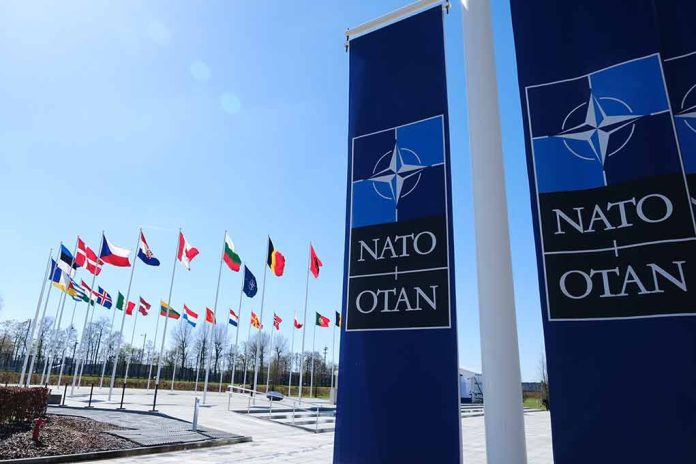🔴 Website 👉 https://u-s-news.com/
Telegram 👉 https://t.me/usnewscom_channel
NATO Secretary General Mark Rutte’s stark admission that Ukraine is “not there” for peace talks with Russia exposes the West’s failed strategy and raises alarming questions about the true cost of this protracted conflict.
At a Glance
- NATO chief Mark Rutte admits Ukraine is too weak for peace talks with Russia
- Russia gains advantage due to manpower and industrial capacity, despite Western aid
- Trump’s potential election complicates Ukraine’s position and Western support
- Massive military aid or Western intervention proposed to counter Russian strength
- European defense industries face challenges in supporting Ukraine effectively
Ukraine’s Weakness Exposed: NATO Chief’s Sobering Assessment
In a startling admission, NATO Secretary General Mark Rutte has revealed the harsh reality facing Ukraine in its ongoing conflict with Russia. Despite years of Western support and billions in aid, Ukraine finds itself in a precarious position, unable to negotiate from a stance of strength against its formidable adversary.
“At this moment, clearly Ukraine is not there, because they cannot at this moment negotiate from a position of strength,” Rutte candidly stated, exposing the ineffectiveness of the West’s strategy in bolstering Ukraine’s defenses.
JUST IN: NATO Chief Mark Rutte says Ukraine is not currently in a strong enough position for peace talks with Russia.
“At this moment, clearly Ukraine is not there, because they cannot at this moment negotiate from a position of strength.”
“We have to do more to make sure by… pic.twitter.com/fsIJdux9fQ
— BRICS News (@BRICSinfo) January 13, 2025
This revelation comes as a blow to those who have championed the cause of Ukrainian sovereignty, raising questions about the true impact of Western intervention and the sustainability of continued support.
Russia’s Growing Advantage: A War of Attrition
The conflict between Russia and Ukraine has devolved into a war of attrition, with Russia gaining a significant upper hand. Despite substantial Western military support, Ukraine has been unable to counter Russia’s growing strength, which is bolstered by its vast manpower and robust industrial capacity.
Adding to Ukraine’s woes, Russia has received crucial support from China, Iran, and North Korea, including military aid and manpower. This alliance has tipped the scales further in Russia’s favor, making the prospect of a Ukrainian victory increasingly remote.
“The reason for continuing the war is Putin’s reasonable expectation that western support for Ukraine will decline even further.” – Historian Sergey Radchenko
This assessment by Radchenko underscores the strategic calculus behind Russia’s continued aggression, betting on the waning resolve of Western nations to support Ukraine indefinitely.
The Trump Factor: A Potential Game-Changer
The potential election of Donald Trump as U.S. President introduces another layer of complexity to an already volatile situation. Trump’s well-known skepticism towards aid for Ukraine could significantly alter the dynamics of Western support, potentially leaving Ukraine even more vulnerable.
The looming Trump presidency has already sent shockwaves through NATO and European allies, with many fearing a dramatic shift in U.S. foreign policy that could leave Ukraine isolated in its struggle against Russian aggression.
The West’s Dilemma: Escalation or Capitulation?
Faced with Russia’s growing advantage, Western nations find themselves at a crossroads. Some experts argue for a massive increase in military aid to Ukraine or even direct Western intervention to level the playing field. However, such moves carry the risk of further escalation and potential global conflict.
“Whenever we get to a deal on Ukraine it has to be a good deal, because what we can never have is high-fiving Kim Jong Un and Xi Jinping and whoever else.” – NATO Secretary-General Mark Rutte
Rutte’s statement highlights the high stakes involved in any potential peace deal, emphasizing the need to avoid a resolution that could be perceived as a victory for Russia’s allies.
European Defense Industries: Unprepared and Overwhelmed
The conflict has exposed critical weaknesses in European defense industries, which face significant challenges in supporting Ukraine effectively. Limited stockpiles, a weak industrial base, and fragmented military structures across Europe have hampered efforts to provide sustained and meaningful assistance to Ukraine.
Proposals for a European Supplemental Fund, potentially funded by Eurobonds, have been floated as a solution to streamline military aid and procurement. However, the European Union’s reluctance to issue joint debt presents a significant obstacle to these funding efforts, leaving Ukraine in a precarious position.
The Road Ahead: Uncertain and Treacherous
As the conflict drags on, with no clear end in sight, the international community faces difficult choices. The need to support Ukraine’s sovereignty must be balanced against the realities of Russian military superiority and the risks of further escalation.
“I am convinced that peace can only last if Ukraine comes to the table from a position of strength.” – Mark Rutte
While Rutte’s statement reflects the ideal scenario, the current reality paints a much more complex picture. As Western resolve wavers and Russia’s position strengthens all eyes are on President-elect Trump to help negotiate a strong and lasting peace for the future.
